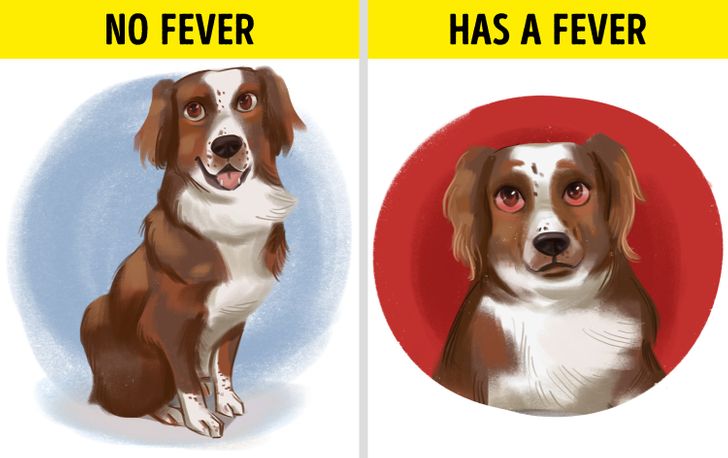To check if your dog has a fever, you can use a rectal thermometer to take its temperature. A normal dog temperature ranges from 100.5 to 102.5°F.
If it’s above, your dog might have a fever. Fever in dogs can be a sign of an underlying health issue and should be addressed promptly. Monitoring your dog’s temperature and observing for other symptoms like lethargy, loss of appetite, or shivering can help determine if it has a fever.
If you suspect your dog has a fever, it’s important to consult a veterinarian for proper diagnosis and treatment. Understanding the signs of fever in dogs can help you provide timely care and ensure your pet’s well-being.
Detecting Fever In Dogs: Key Signs
Understanding Normal Dog Body Temperature: A dog’s normal body temperature ranges between 100.5°F and 102.5°F. Any temperature above this range may indicate a fever.
At-Home Methods for Detecting Fever: You can detect if your dog has a fever by feeling their ears, nose, and paws. Warm or hot to the touch may indicate a fever. Also, observe for signs such as lethargy, shivering, lack of appetite, or coughing, which can be key indicators of a fever.
When to Use a Rectal Thermometer: If you suspect your dog has a fever, it’s important to confirm with a rectal thermometer. Consult your veterinarian on how to properly use a rectal thermometer for an accurate reading.
Canine Fever Symptoms To Monitor
When monitoring your dog for fever, pay attention to their increased warmth in ears and paws. If your dog seems to be shivering or shaking unusually, this could also indicate a fever. Additionally, watch for elevated heart rate and rapid breathing, as these are common signs of fever in dogs. Another symptom to note is lethargy or decreased energy, as fever can cause a reduction in activity levels. Finally, keep an eye out for signs of loss of appetite and dehydration, as these can be indicative of a fever. Monitoring these symptoms can help you identify if your dog has a fever and seek appropriate veterinary care.
How Do I Know If My Dog Has A Fever: Essential Signs To Watch For
It is important to recognize the signs that may indicate your dog has a fever. Some behavioral changes and discomfort should be closely monitored. Moreover, check for dryness of the nose and any changes in gums. In addition, keep an eye out for red or glassy-looking eyes as this could be a sign of fever. Additionally, watch for vomiting or any other gastrointestinal signs, as these might indicate a fever in dogs.
When To Seek Veterinary Care
If your dog shows persistent symptoms such as lethargy, lack of appetite, or has a high temperature, it is important to seek veterinary care. Additionally, if you notice any other concerning health symptoms such as vomiting, diarrhea, or difficulty breathing, it’s crucial to consult a veterinarian. Certain risk factors, including age and underlying medical conditions, warrant immediate attention. When you visit the veterinary office, the veterinarian will conduct a thorough examination, which may include temperature measurement, blood tests, and other diagnostic procedures to identify the underlying cause of your dog’s symptoms.
Managing A Dog’s Fever At Home
If you suspect your dog has a fever, it’s essential to monitor their temperature regularly and look for signs of discomfort. Effective cooling techniques such as applying damp towels or using a fan can help reduce your dog’s body temperature. Additionally, make sure your dog has access to fresh water at all times to stay properly hydrated. Offer easily digestible, nutritious meals to help support your dog’s immune system. Following any treatment, continue to monitor your dog for any changes in behavior or temperature. Preventive measures, including regular veterinary check-ups and vaccinations, are crucial for maintaining your dog’s overall health and well-being.

Credit: www.huntersville.carolinavet.com
Frequently Asked Questions For How Do I Know If My Dog Has A Fever
What Are The Common Symptoms Of Fever In Dogs?
A dog with a fever may display symptoms such as lethargy, loss of appetite, shivering, and a warm and dry nose.
How Can I Check My Dog’s Temperature For Fever?
You can use a rectal thermometer to take your dog’s temperature. Lubricate the thermometer, gently insert it into the rectum, and wait for the reading.
When Should I Seek Veterinary Care For My Dog’s Fever?
If your dog has a fever over 103°F, or if the fever persists for more than 24 hours, consult a veterinarian for guidance and treatment.
Conclusion
Detecting a fever in your dog is vital for their health. By monitoring their behavior, using a thermometer, and seeking veterinary help when in doubt, you can ensure your pet receives timely treatment. Remember, a fever is a symptom, not a diagnosis – so be proactive in caring for your furry friend’s well-being.



